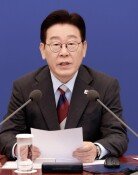[Editorial] Ambassador Choi's statement of concern
[Editorial] Ambassador Choi's statement of concern
Posted October. 29, 2000 21:05,
Korean Ambassador to Japan Choi Sang-Yong has expressed his deep concern at an official occasion over Japanese textbooks' distortion of history. The Institute for World Peace Studies (IWPS) invited Ambassador Choi as a keynote speaker at its meeting on Oct. 27. The IWPS's chairman of the board is Mr. Nakasone Yashiro, ex-Japanese Prime Minister.
Ambassador Choi stated that he has no intention to interfere with Japan's internal affairs, but he emphasized that it is important to regard empirically verified historical facts as truth for future-oriented, bilateral relations between Korea and Japan. Ambassador Choi warned that in now way should there be any distortions of historical truth.
There was an outrageous occurrence in Japan on Oct. 26, the day before the speech Korean Ambassador Choi delivered as a diplomat of a nation victimized by past Japanese aggression. Japan's ruling Liberal Democratic Party (LDP) members reportedly demanded the dismissal of a member of the Japanese ministry of education's textbook screening committee for the rightful views he expressed at the committee. The person, who was a former Japanese diplomat, apparently urged his fellow committee members to disqualify the textbooks by the publisher that caused enormous controversy due to their historically distorted contents. Immediately thereafter, it was reported, the LDP members asked Japanese education minister Oshima Dadamori to fire the former diplomat-turned committee member.
Victimized nations of Japanese aggression, including Korea and China, are keeping an apprehensive eye on Japan's distorted middle school textbooks for the year 2002. The dubious aspect of the textbooks that are seeking the committee¡¯s approval is that they eliminated all references to such varied historical facts as ``comfort women¡± for Japanese soldiers; their forced draft; compensation issues; their aggression in Korea and China as well as colonial rule and the Korean uprising against them. In a nutshell, their moves represent nothing but the destruction of evidence of indisputable historical facts.
The apprehensions the neighbor countries have over Japan are not by any means due to their obsession with the past or a sense of shame. We have rightful misgivings about Japanese intentions if Japan is attempting to deny its past aggressions against its neighbors, and if it is aiming to teach its younger generation by making them feel hazy and ambiguous about the historical responsibilities for its past wrongdoing.
We have some deep skepticism over what appears our historical fate that we have to, live with Japan in the future as a neighbor side by side for better or worse, even if Japan attempts to whitewash its past. Japan may well be advised by Ambassador Choi's opening remarks in his speech, which concentrated on the issue of Japan's historical distortions in an hour-long address: ``Historical truths are in themselves as sacrosanct as God's truth.''
Yet, the government officials seem to regard that Korea-Japan relations are, more than at any other time in the past, making friendly and future-oriented progress since President Kim Dae-Jung's visit to Japan two years ago, which gave rise to far-reaching policies to open¡¯s cultural markets. Japan's recent attitudes and conduct make us seriously doubt whether such a progress has, indeed, been in the making.




![아침 공복 따뜻한 물 한 잔, 정말 살 빠지고 해독될까?[건강팩트체크]](https://dimg.donga.com/c/138/175/90/1/wps/NEWS/IMAGE/2026/03/05/133467930.3.jpg)


